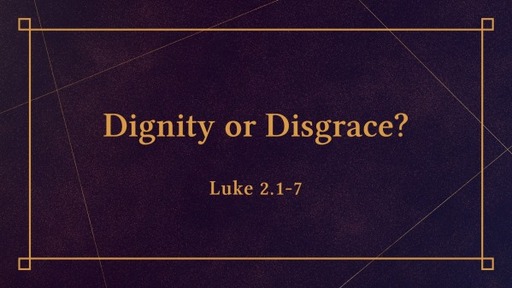Dignity or Disgrace?

The explanation given for this unusual resting place is cryptic and carries no great weight in the story, κατάλυμα is a flexible word and can denote any kind of place where one might stay, from a primitive inn (Exod 4:27; 1 Kgdms 1:18) to a guest-room of a house (cf. Luke 22:11) to a totally unspecified place where one might stay (Sir 14:25; and cf. Exod 15:13). If we are to understand that Mary and Joseph were excluded from the κατάλυμα, then the definite article favors reference to the public inn at Bethlehem (cf. Jer 41:17), though the guest-room of the family home remains possible (K. E. Bailey, NESTR 2 [1979] 33–44).
Joseph probably wept as much as Mary did. Seeing her pain, the stinking barnyard, their poverty, people’s indifference, the humiliation, and the sense of utter helplessness, feeling shame at not being able to provide for young Mary on the night of her travail—all that would make a man either curse or cry.
If we imagine that Jesus was born in a freshly swept, county fair stable, we miss the whole point. It was wretched—scandalous! There was sweat and pain and blood and cries as Mary reached up to the heavens for help. The earth was cold and hard. The smell of birth mixed with the stench of manure and acrid straw made a contemptible bouquet. Trembling carpenter’s hands, clumsy with fear, grasped God’s Son slippery with blood—the baby’s limbs waving helplessly as if falling through space—his face grimacing as he gasped in the cold and his cry pierced the night.6
My mother groaned, my father wept.
Into the dangerous world I leapt.7
It was clearly a leap down—as if the Son of God rose from his splendor, stood poised at the rim of the universe irradiating light, and dove headlong, speeding through the stars over the Milky Way to earth’s galaxy, finally past Arcturus, where he plunged into a huddle of animals. Nothing could be lower.
Luke finishes the picture in verse 7: “She wrapped him in cloths and placed him in a manger, because there was no room for them in the inn.” Mary counted his fingers, and the couple wiped him clean as best they could by firelight. Mary wrapped each of his little arms and legs with strips of cloth—mummy-like. No one helped her. She laid him in a feeding trough.
No child born into the world that day seemed to have lower prospects. The Son of God was born into the world not as a prince but as a pauper. We must never forget that this is where Christianity began, and where it always begins—with a sense of need, a graced sense of one’s insufficiency. Christ, himself setting the example, comes to the needy. He is born only in those who are “poor in spirit.”
The Incarnation provides a marvelous paradigm for Christ’s work in our lives. Every Advent season, and hopefully at other times as well, we are brought again to the wonder of the Incarnation. See the swaddled Jesus, lying in the feeding trough in the stable, the birthplace of common livestock. Look long and hard with all your mind and all your heart. From early times the paradox of the Incarnation has given birth to mind-boggling expressions. St. Augustine said of the infant Jesus:
Unspeakably wise,
He is wisely speechless.8
Lancelot Andrewes, who crafted much of the beautiful English of the Old Testament in the King James Version, preaching before King James on Christmas Day 1608, picked up on Augustine’s idea and described Christ in the manger as:
the word without a word.9
He is in his person the Word of God!
Luci Shaw, in her beautiful poem “Mary’s Song,” says:
Quiet he lies
whose vigor hurled
a universe. He sleeps
whose eyelids have not closed before.10
The one who asked Job, “Where were you when I laid the earth’s foundation? Tell me, if you understand … when I made the clouds its garment and wrapped it in thick darkness” (Job 38:4, 9) now himself lay wrapped in swaddling clothes.
The wonder of the Incarnation! The omnipotent, omnipresent, omniscient God became a baby!
